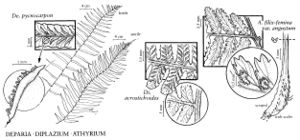Athyrium
Tent. Fl. Germ. 3(1,1): 31, 58. 1799.
| Taxon | Illustrator ⠉ | |
|---|---|---|
 | Athyrium filix-femina var. angustum Deparia acrostichoides Diplazium pycnocarpon | John Myers John Myers John Myers |
Plants generally terrestrial. Stems short-creeping or ascending, stolons absent. Leaves monomorphic, usually dying back in winter. Petiole ± 0.5 times length of blade or less, base swollen and dentate, persisting as trophopod over winter or not; vascular-bundles 2, lateral, lunate in cross-section. Blade lanceolate to elliptic or oblanceolate, 1–3-pinnate-pinnatifid, gradually reduced distally to confluent, pinnatifid apex, herbaceous. Pinnae not articulate to rachis, segment margins serrulate or crenate; proximal pinnae often reduced, sessile to short-petiolulate, ± equilateral; costae adaxially grooved, grooves continuous from rachis to costae to costules; indument absent or of linear to lanceolate scales or 1-celled glands abaxially. Veins free, simple or forked. Sori in 1 row between midrib and margin, round to elongate, straight or hooked at distal end, or horseshoe-shaped; indusia shaped like sori, persistent, attached laterally or with narrow sinus, or indusia absent. Spores brownish, rugose. x = 40.
Distribution
Worldwide
Discussion
In species outside the flora stems are sometimes long-creeping to erect, with leaves radially or dorsiventrally arranged.
Species about 180 (2 in the flora).
Selected References
Lower Taxa
Key
| 1 | Sori round, submarginal; indusia much reduced or usually absent. | Athyrium distentifolium var. americanum |
| 1 | Sori elongate or hooked, medial; indusia well developed. | Athyrium filix-femina |
"timeslengthofblade" is not declared as a valid unit of measurement for this property.